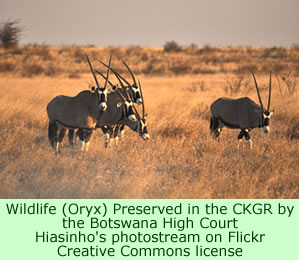The government of Botswana won its case in the nation’s High Court last week, where it sought to prevent the San people from having access to water in their homes. The court decided against the G/wi and G//ana San, who had requested access to water, and in favor of the government, which wants to permanently prevent them from living in the Central Kalahari Game Reserve (CKGR). The San appeal, filed last month but turned down last week, had asked that they be allowed to reopen a borehole that had provided water before they were forcibly removed from their homes in 2002.
The High Court had decided in 2006 that the government did not have the right to forbid the San peoples from living in their traditional homes in the CKGR. That right is guaranteed in the country’s constitution.
 According to news stories last week about the decision, the government had argued that allowing the San—or Bushmen as they are often called—to live in the CKGR is not compatible with the stated goal of preserving the reserve for wildlife. The court obviously agreed. A spokesperson for the San people, Jumanda Gakelebone, said the decision made no sense at all, and the community plans to appeal.
According to news stories last week about the decision, the government had argued that allowing the San—or Bushmen as they are often called—to live in the CKGR is not compatible with the stated goal of preserving the reserve for wildlife. The court obviously agreed. A spokesperson for the San people, Jumanda Gakelebone, said the decision made no sense at all, and the community plans to appeal.
Fiona Watson, the Africa expert for Survival International, the London-based NGO that is supporting the San in their desire to live in their ancestral homeland, said simply that the government wants to force the San people out. “They have contempt for the Bushmen’s way of life.”
At the same time that the government is protecting wildlife in the CKGR by harassing the San people, it is promoting tourism and diamond mining, which require boreholes for water. The government stipulates that companies which build a tourist lodge or a mining facility may not share their water with neighboring San villages.
The case was heard, and dismissed, by one of the three justices on the High Court, Lakhvinder Walia. Rejecting the argument that the government was subjecting the San people to inhuman treatment by denying them access to water, the judge said that they themselves “have chosen to settle in areas far from those facilities. They have become victims of their own decision to settle an inconveniently long distance from the services and facilities provided by the government.”
The judge decided that the government is under no obligation to provide essential services to the San people, and, by extension, “it is under no obligation to facilitate any such service.” Apparently, that means the government can legally prevent people from having access to water. Judge Walia also denied a contention made by Gordon Bennett, the attorney for the San people, that Section 6 of the Water Act gave the dwellers on government land the right to drill for water. He found inconsistencies in the sections of the act to sustain the government’s opposition to allowing the San to open a new borehole.
Stephen Corry, the director of Survival International, said that “in the last 10 years, Botswana has become one of the harshest places in the world for indigenous peoples.” Corry urged consumers who are concerned about human rights to consider the treatment of the indigenous people of that country before they embark on tours to Botswana, and before they purchase jewelry mined in a country with such a repressive regime.